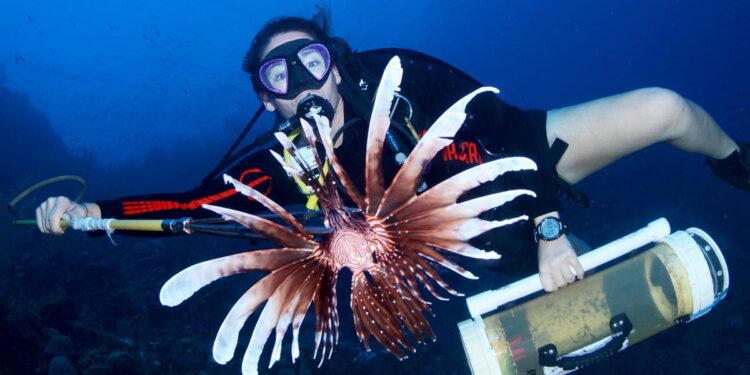Lisette Keus of Lionfish Caribbean, a business that turns invasive lionfish into jewelry.
Lionfish Jewelry
Lisette Keus is on the hunt.
The shallow waters next to the Curaçao Marriott Beach Resort are teeming with invasive lionfish, and Keus, an accomplished lionfish hunter, knows where they are hiding.
“They’re not easy to find,” says Keus, who runs a business called Lionfish Caribbean, which turns these unwanted predators into jewelry. “But with some practice, you develop a sense of focus — and then you see them.”
And she does. There’s one under a rock, its spine moving back and forth in the current. Keus calmly grips her Hawaiian sling spear, aims, and takes the shot.
Keus is part of this Caribbean island’s sustainability efforts. Hotels on Curaçao are doing everything from reef cleanup to next-level conservation initiatives to preserve the fragile Caribbean ecosystem. Even Fabien Cousteau, grandson of famed explorer Jacques Cousteau, is about to become a player in this island’s sustainability landscape.
“People here are starting to understand that we should leave the Earth better than we found it, which is I think the essence of sustainability,” says Manfred van Veghel, director of the Caribbean Research and Management of Biodiversity, a nonprofit foundation that conducts environmental research in Curaçao. “We can’t just push everything on the next generation.”
This is part four in a series about sustainable tourism in Central America and the Caribbean. Here’s part one about sustainability in Panama, part two about saving Bonaire’s number one tourist attraction and part three about Aruba’s struggles to stay sustainable.
Cufflinks made by Lionfish Jewelry in Curaçao. The island is trying to maintain balance on its … [+] fragile coral reefs by hunting lionfish.
Lionfish Jewelry
Turning predators into pendants in Curaçao
Back on the reef, Keus releases the elastic band on her spear. The three razor-sharp prongs pierce the fist-size lionfish, killing it instantly. But its long spines continue to undulate gently in the current, making it appear to be alive. Keus slides the fish into a cylindrical plastic container called a ZooKeeper, specially built to contain the venomous lionfish.
Keus will bag another lionfish before her hunt ends and will bring them back to a picnic table at her dive shop. Nothing goes to waste. She turns the fins into necklaces, cufflinks and pendants to sell at her jewelry shop in Willemstad. And the rest of the Lionfish belongs to the dive shop’s resident cat, Cesa.
“I have a tremendous amount of respect for the lionfish,” she says. “We have to hunt them. But we can also make the most of what we catch.”
Why is hunting lionfish necessary for sustainability? Lionfish are not native to the Caribbean, and they excel at reproducing. Females release 50,000 eggs every three days.
That’s right; every three days. Today, they are spreading through the Caribbean waters unchecked.
Lionfish are excellent hunters themselves and clear the reef of many native fish. They can eat a fish up to half the length of their body, including grouper, parrotfish and snapper. The only way to control the lionfish population is to hunt them, and the best way to hunt them is by strapping on a scuba tank, grabbing a spear, and descending to a depth of about 60 feet, where they hide under coral and rocks.
Dan Waters, general manager of Sandals Royal Curaçao, with plastic collected during an Earth Day … [+] event at the resort.
Christopher Elliott
A sprawling sustainability program at Sandals
On the other side of the island, at the Sandals Royal Curaçao, a different kind of sustainability program is unfolding. The two-year-old property is coming at the sustainability problem from every angle, including recycling, conservation and community outreach.
“We’re still in the early stages,” says Dan Waters, the hotel’s general manager.
He’s being modest. The Sandals hotel chain has a long-standing conservation program that helps the resort save and recycle water, electricity and food. At the moment, Waters is standing in front of several bags of recycled bottles, which his staff collected as part of an Earth Day event at the all-inclusive property. There’s also the Sandals Foundation, the nonprofit arm of the company, that funds a variety of community projects.
Waters says Sandals guests want to do good. Many of them visit Curaçao schools during their vacation and read to students as part of the Sandals Foundation outreach. The company has also donated equipment to a local recycling business that is turning plastic trash into souvenirs.
Mitchell Lammering, co-owner of Limpi Recycling, holds a soccer goal post made from recycled … [+] plastic, while co-owner Debrah Nijdam holds shredded plastic used to make the equipment.
Christopher Elliott
Limpi Recycling is a new business that creates keychains, decorative art and soccer goalposts out of plastics that would otherwise harm the environment. Debrah Nijdam, co-owner of Limpi, says the company sources the plastic from the usual places — thrown away containers from trash and recycling bins. But they also get them from one place that others might not.
Limpi sponsors beach cleanups where volunteers visit the north end of the island. That’s where strong currents regularly deposit trash from the ocean. Nijdam estimates that they collect about 100 kilos of plastic per month. Then they return to their workshop, where they shred the plastic, melt it down, and then create new products.
“We started as a project just to create awareness around the plastic waste problem,” says Nijdam. “We wanted to show people that plastic is not trash. It’s something valuable that you can reuse and recycle to make something new.”
Limpi is on to something. Ask anyone in Curaçao and they’ll tell you recycling is the number-one sustainability issue. Hunting lionfish is sexy, but to quote The Graduate, the future can be summed up in one word: plastics.
Gary Farstad, general manager of the Curaçao Marriott Beach Resort, with art made from recycled … [+] plastics. You’ll find this starfish in guest rooms, where it increases awareness of the island’s sustainability challenges.
Christopher Elliott
Marriott saves Curaçao one recycled plastic starfish at a time
One of the hotels that’s all-in on Limpi’s recycled plastics is the Curaçao Marriott Beach Resort.
“We give recycled keychains and luggage tags to our guests,” says Gary Farstad, the property’s general manager.
Limpi also worked on a big project for the Marriott to create decorative fish made entirely from beach-collected plastics on the island’s north shore. Farstad says these decorations are particularly meaningful to visitors who are looking for something to bring home as a keepsake.
“People have been cleaning that area for years, and finally, someone got the bright idea of turning it into something,” he says. “And our guests love doing something good for the environment.”
How did the Marriott get on board with sustainability? Farstad came to this property from Saskatoon, Canada, where he worked closely with the Dakota Nation to incorporate indigenous art into the design of a resort he managed in Whitecap. He says the end result was a hotel that meant as much to the indigenous people who lived there as to the guests. He worked with the tribe to create a more sustainable hotel that collected and recycled rainwater.
“For me,” he adds, “it was a totally different perspective.”
Farstad hoped to bring the lessons he learned to the Marriott in Curaçao and ultimately connect it to the community. That type of involvement is one of the pillars of sustainability. And it’s a path other resorts are also following.
Solar panels on the roof of LionsDive Beach Resort Curaçao. The hotel has made sustainability part … [+] of its employee evaluation process.
LionsDive
How LionsDive built sustainability into its resort
The most forward-looking hotels know that unless they have a buy-in from their guests, sustainability efforts will fall flat. But what about employees? At LionsDive Beach Resort Curaçao, a small property that specializes in diving and family vacations, general manager Mimi Luttge has found a way to nudge sustainability forward by encouraging housekeepers, bellmen and diving instructors to come up with a way to move it to the next level.
“We’ve made sustainability part of our employee evaluation process,” she says. That means every employee review includes a sustainability component. It evaluates workers based on their ideas on how to improve recycling and add renewable energy to the 35-year-old hotel.
“Our employees have ideas — everything from beach cleanups to animal rescue — and we’ve decided to work with a number of charities on the island. And when we ask for volunteers, there are always people standing up saying, ‘Hey, I want to help,'” she says.
Luttge says it’s also led to a deep and meaningful conversation about what the hotel can do to reduce its carbon footprint and promote sustainability in resource-strapped Curaçao. She’s taken some of those ideas to the Curaçao Hospitality and Tourism Association, an island hospitality trade group that she leads.
Divers survey the reef on the site of the new Proteus underwater lab.
Proteus
Coming next: an underwater lab in Curaçao
All of these projects are adding to Curaçao’s environmental credentials. But what may put it over the top is set to arrive soon. It’s a new underwater lab called Proteus, dubbed the International Space Station of the Ocean. The project, helmed by environmental advocate Fabien Cousteau, is a modular underwater habitat that will be used for marine research and exploration. It’s scheduled for deployment off the coast of Curaçao in 2027.
Proteus could put this island on the map as a model for sustainability, and not just because of the Cousteau pedigree. The lab’s goal of researching the most pressing issues Earth faces is certain to put it into the middle of an ongoing debate about sustainability. Of course, the hotels on the islands are eager to help. Already, Sandals has offered to ferry volunteers to Proteus in its dive boat.
Curaçao is home to one of the few remaining Caribbean reefs that is still growing, says Lisa Marrocchino, CEO of Proteus Ocean Group.
“Our scientists have already installed a suite of sensors to capture variables ranging from temperature to water quality to the acoustic environment,” she told me. “The goal is to build an extensive network that will inform conservation approaches to benefit Curaçao’s coral reefs.”
There is, of course, the necessary reality check: The typical visitor to Curaçao really just wants to hang out at the beach with a drink. Will any of these sustainability efforts make a difference? The truth is, people on Curaçao want to be good stewards of their island, but they don’t want it to cost too much, and they don’t want to lose business.
Travel to Curaçao is booming, and no one wants to do anything to jeopardize it. An environmental message that’s too forceful might be a turnoff to tourists. But not trying to be green isn’t an option either.
The tourism industry on this island walks a fine line, as they do in the rest of the Caribbean.
Source link : http://www.bing.com/news/apiclick.aspx?ref=FexRss&aid=&tid=6711b5bcae4340e19426c55d35e21bc1&url=https%3A%2F%2Fwww.forbes.com%2Fsites%2Fchristopherelliott%2F2024%2F04%2F28%2Fcuraao-hunts-for-sustainability-in-the-caribbean—and-a-lionfish-or-two%2F&c=11437060945849407347&mkt=en-us
Author :
Publish date : 2024-04-27 23:42:00
Copyright for syndicated content belongs to the linked Source.












